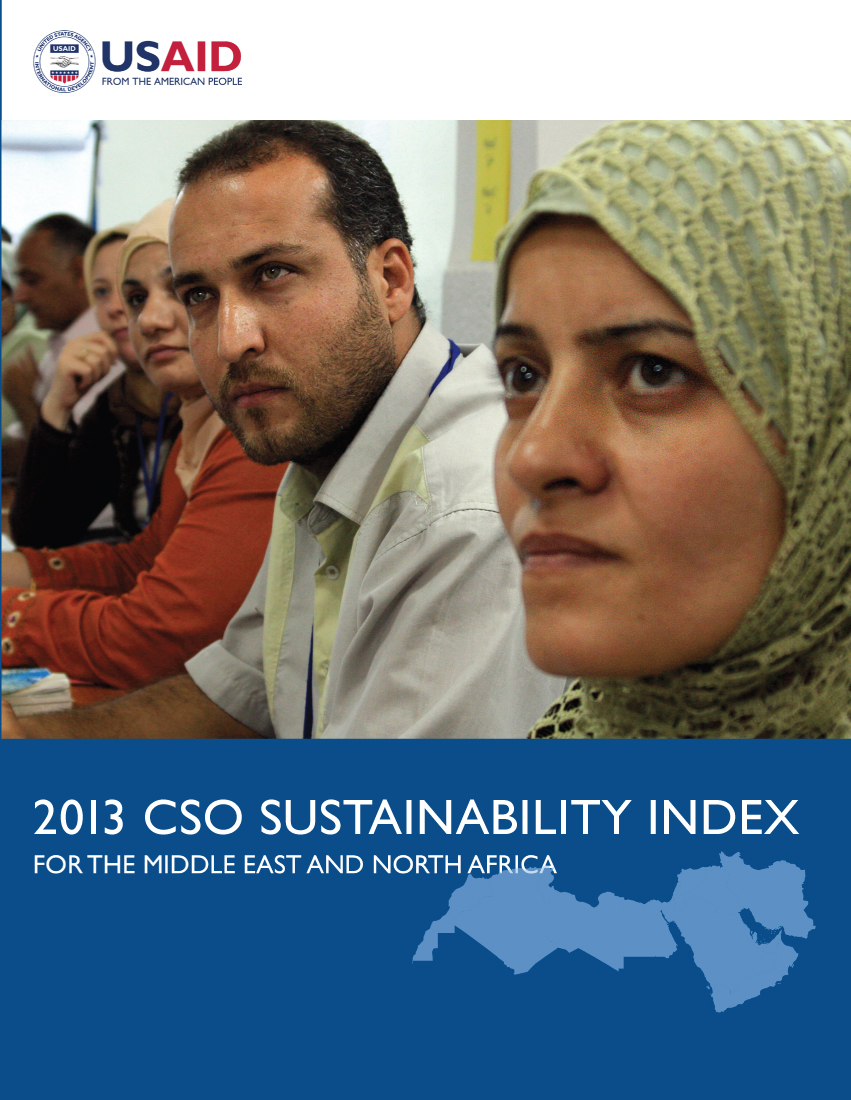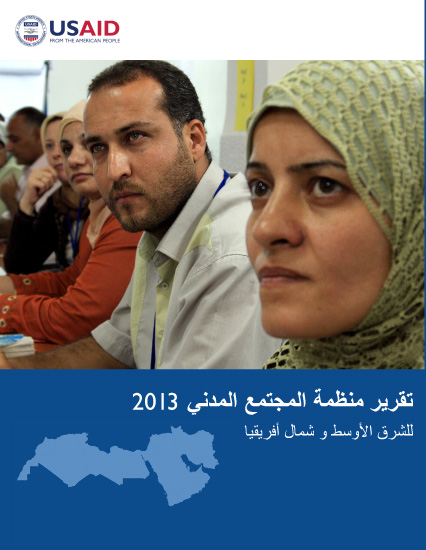- What We Do
- Agriculture and Food Security
- Democracy, Human Rights and Governance
- Democracy, Human Rights and Governance Strategy
- Supporting Free and Fair Elections
- Supporting Vibrant Civil Society & Independent Media
- Protecting Human Rights
- Promoting Accountability & Transparency
- Importance of Democracy, Human Rights, & Governance to Development
- Countering Trafficking in Persons
- Economic Growth and Trade
- Education
- Ending Extreme Poverty
- Environment and Global Climate Change
- Gender Equality and Women's Empowerment
- Global Health
- Water and Sanitation
- Working in Crises and Conflict
- U.S. Global Development Lab
BACKGROUND
USAID is pleased to present the second edition of the Civil Society Organization (CSO) Sustainability Index for the Middle East and North Africa (MENA) for Calendar Year 2013.The index relies on local expertise to assess key components of the CSO sectors in Egypt, Iraq, Jordan, Lebanon, Morocco, and Yemen, as well as in the West Bank and Gaza. The CSO Sustainability Index for 2013 is intended to serve as a useful information source for CSOs, governments, donors, and academics to better understand key aspects of sustainability of the CSO sector.
APPROACH
The Index analyzes seven interrelated dimensions of CSO sustainability: legal environment, organizational capacity, financial viability, advocacy, service provision, infrastructure, and public image. In each country/territory, a local CSO partner convenes a diverse expert panel of CSO experts and representatives. The country panels discuss and assess the seven dimensions for the year covered, placing each dimension, as well as CSO Sustainability overall, in one of three categories: Sustainability Enhanced, Sustainability Evolving, or Sustainability Impeded. The CSO partners then develop the country indexes using desk research and information provided by the expert panel.
FINDINGS
The Middle East and North Africa continued to be a turbulent region in 2013. Several places experienced political instability during the year. In Egypt, widespread public protests were followed by the ouster of President Mohamed Morsi in July 2013; military leaders then appointed an interim government. Morocco experienced an eight-month political stalemate after the Istiqlal Party left the coalition government. In the West Bank and Gaza, relations between the two main Palestinian political parties—Fatah and Hamas—continued to be tense, while the Palestinian Authority (PA) endured intense political and financial pressures and continued to risk criticism for resuming stalled peace talks with Israel. The transition government in Yemen, which assumed power at the beginning of 2012, remained fragile during the year. Meanwhile, there were continued calls for political reform in Jordan.
Security also continued to be an issue throughout the region. In Iraq, the security situation deteriorated significantly in 2013, as terrorist attacks grew in frequency. In Yemen, political violence by militant groups including Al-Qaeda in the Arabian Peninsula (AQAP) continued to be an issue during the year. The civil war and resulting humanitarian crisis in Syria, which is not covered by the CSO Sustainability Index, also had a spillover effect in the countries covered in this publication, with Iraq, Jordan, and Lebanon all accepting large numbers of refugees.
The seven countries and territories covered by the CSO Sustainability Index for the Middle East and North Africa also continued to struggle economically. Many deal with high rates of unemployment. According to UNESCO, in the fourth quarter of 2013 the unemployment rate was 21.4 percent in the West Bank and 41.5 percent in Gaza. Youth unemployment rates were 33.1 percent in the West Bank and 61.7 percent in Gaza. Yemen had a 40 percent unemployment rate. The Morocco report notes that the county faced economic challenges in 2013.
Several trends affecting civil society were apparent in the region in 2013. While several governments took action to close civic space during the year, others increasingly acknowledged the sector’s influence through formal dialogues and documents. At the same time, the ongoing civil war in Syria continued to impact the neighboring countries of Iraq, Jordan, and Lebanon, affecting several dimensions of CSO sustainability, including service provision, organizational capacity,









Comment
Make a general inquiry or suggest an improvement.